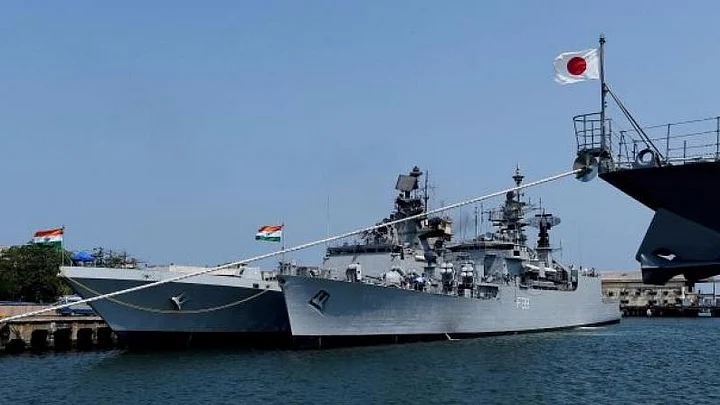On Wednesday, China welcomed India's decision to reject Australia's request to join Malabar naval exercises, 2017, saying the security concerns of different parties should be taken into account while holding such drills.
I have seen the relevant reports on the refusal made by India for the invitation. I think India is also clear about the consideration behind this behaviour. But I think we are happy to see normal dialogue and communications on security issues. But we also hope that when conducting such operations, the parties can fully consider the security concerns of different parties, and also play a positive and constructive role in promoting regional peace and stability.Hua Chunying, Spokesperson of Chinese Ministry of Foreign Affairs
India on Tuesday rejected the Australian request to take part in joint naval exercises with the United States and Japan for the fear of antagonising China, which has warned against expanding the drills, navy officials and diplomats said.
Australia formally wrote to the Indian defence ministry in January, asking if it could send naval ships to join the July war games as an observer, in what military experts saw as a step toward eventual full participation.
Four officials from India, Australia, and Japan told Reuters that India blocked the proposal, and suggested that Canberra send officers to watch the exercises in the Bay of Bengal from the decks of the three participating countries’ warships, instead.
A spokesman for Australia's Minister of Defence Marise Payne refused to comment on the Malabar exercises. But one Australian official, speaking on condition of anonymity, because of the sensitivity of the matter, said it was increasingly unlikely that Canberra would join the drills, although it was keen to do so. Australia has also traditionally been wary of upsetting China, its largest trading partner.
New Delhi is worried that China will step up activities in the Indian Ocean, where it is building infrastructure in Sri Lanka, Bangladesh and Pakistan, feeding India's anxiety about being encircled, Indian military sources and diplomats said.
India Wary of Chinese Presence in Indian Ocean
Indian navy officials say there have been at least six submarine deployments by China in the Indian Ocean since 2013, and that Chinese submarines have been docking in Sri Lanka, and its long-time ally, Pakistan.
India is being careful about China. India is aware they have upped their maritime engagement in this part of the world and they could just become more brazen with their submarine deployments. We don’t want that to happen.Abhijit Singh, Former Naval Officer, Head of Maritime Studies at ORF
New Delhi's ties with Beijing have soured in recent years over a territorial dispute in the Himalayas and China's military support of Pakistan.
China has also been concerned that Prime Minister Narendra Modi's avowedly nationalist government has stepped up public engagement of the Dalai Lama, the Tibetan spiritual leader who lives in exile in India and whom it regards as a "splittist".
An Indian defence ministry spokesman confirmed there had been a request from Australia for observer status in the July exercises, but he said he was not in a position to provide any details of the Indian response.
Both the United States and Japan supported the idea of involving Australia, seeing it as a natural partner in the effort to balance China's growing might, the four officials said.
What are The Malabar Exercises?
The Malabar exercises started out as India-US drills in 1992, but have included Japan every year from 2014.
Dozens of warships, submarines and aircraft take part in the war games, which are aimed at getting the three powerful navies used to working together. US military officials say this will help in future operations, including joint patrols across the Indian Ocean and the Pacific.
The exercises are now held in waters close to the East and South China Sea, as well as the Indian Ocean.
China, which claims most of the South China Sea, has protested the expansion. Neighbours Brunei, Malaysia, the Philippines, Taiwan and Vietnam also have claims on the strategic waterway, through which about $5 trillion in ship-borne trade passes every year.
(With inputs from Reuters and PTI)
